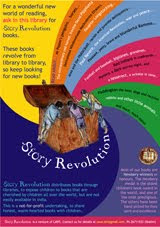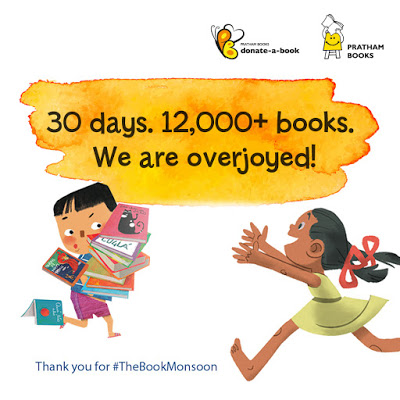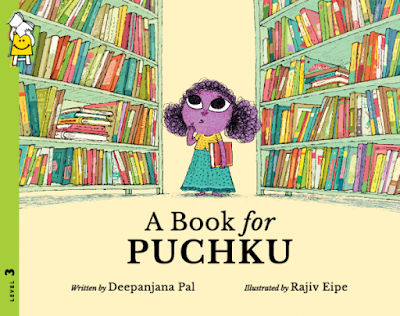Sensitizing through Stories : Story Revolution


Shalini Sekhar and Angela Jain, both teachers at Shibumi, a school in Bangalore, run a unique online bookstore devoted exclusively to children’s literature sourced from second hand bookshops in their own city, and from wherever else they happen to travel to.
As Angela puts it, Story Revolution is not just a bookstore, it is a “selection service.” Each of these books have been read by either Shalini or Angela. They offer books that are much celebrated, but difficult to come by in India. Most of their titles are Newbery medal or honour books. The Newbery Medal is a prestigious award given by the American Library Association to the most distinguished American children’s book published every year. Others in the Story Revolution collection are “books that are handpicked for their spirit and excellence,” their website (http://www.storyrevolutionbooks.com/) would tell you.
“Children should get good literature, not just about anything. We scrutinize each book carefully. The writing
style is good, and also the fact that these are stories coming from a sensitivity to things around. There are no rigid ideas about teaching morals attached to these stories,” says Angela.
She agrees that some of the books might be difficult because of the specific historical background they deal
with, but is quick to point out that books are a good way of getting children exposed to different cultures, and that all the Story Revolution books deal with human emotions we all share wherever we are.
Shibumi, the school they helped co-found, is one and a half years old. It was around the time they were looking
for resources for the Shibumi library that the idea of Story Revolution started taking shape.
“We were collecting lots of books, and some were really good ones. We came across second and third copies of these books. It seemed amazing; sort of like a treasure. We wanted to share these with as many people as we could but we didn’t have big money, so we started to think of other ways,” shares Shalini.
The name ‘Story Revolution’ has an interesting history behind it. The online bookstore happened later; the initial idea had to do with ‘revolving’ books across libraries. On their visits to local circulating libraries, they found that Nancy Drew, Hardy Boys, Enid Blytons, and Sweet Valley were the most popular books around. There seemed to be little space for other kinds of books for children.
Shalini and Angela interacted with two libraries, and it was agreed that the Story Revolution books would be kept as an experiment. Each library would get a different set of books every month, and the previous month’s books would be passed on to the other library. This experiment did not take off very well. They put in a lot of effort (covering the books, making labels, pasting stickers on how to take care of the books), but stood disappointed at what came of it. A lady at one of the libraries said that the books were not being picked because parents don’t let their kids read them; they think these books distract children from their studies.
There’s another reason behind the name ‘Story Revolution’. Shalini says, “One thought those books were quite a revolution. At that point of time, I felt that any child brought up on these books would turn out to be a really
sensitive and compassionate kid. Of course, now I wouldn’t say something like that. There are so many other factors.”
The good thing that came from the ‘revolving’ experiment though was a phone call from a parent who had relocated to Bangalore from the United States, and was thrilled to find these books in Bangalore. The parent wanted to know if Shalini and Angela sold those books. Around the same time, Parveen Sikand, librarian at the Valley School asked them to put together a collection of books for students. Through Parveen, they met the librarian at St. Joseph’s Boys School, and put together another collection for school children.
The online bookstore grew out of this. Keeping it online seemed simple, convenient and manageable. There are pick-up points in various parts of Bangalore, and books are also shipped to other cities at additional cost.
Before it took an identify of its own, Story Revolution was launched under the wings of Community Animal
Welfare Society (CAWS), a neighbourhood initiative that Shalini and Angela started with Aditya Pandya, a close friend, now colleague at Shibumi. “CAWS was formed when a child in Bangalore got killed by a stray dog.
The atmosphere was very tense, and people wanted to do away with all stray dogs. We wanted to research the whole matter, so we spoke to lots of people, roamed around at night, and even made a film,” says Shalini. They started what they called ‘the guardianship programme’, based on the idea that many people look after stray dogs and feed them anyway; these people will be happy to do a little more if it doesn’t require too much of them and their time – things like taking dogs for vaccination and sterilisation.”
CAWS was an intermediary connecting individuals and NGOs. The acronym CAWS was chosen for the interesting word play it conjures up — because it sounds like CAUSE, and rhymes with PAWS. “At the same time, we started looking for books for Story Revolution – another way to make people sensitive,” says Shalini.
The love of books, and an enthusiasm to share it, was accompanied by a slightly unsettling question: How do we finance this?
Angela shares, “Shalini is the kind who jumps into things. I am the careful one. I had doubts and questions – should we invest? What if nobody buys them? My family members were concerned. They were hoping I wasn’t investing too much. But on the whole, they were very encouraging, also happy that we were taking charge of things. But within the first couple of months, we got a very good response.”
Raising funds to buy books for Story Revolution also involved selling fruit juice! Shalini’s family has a starfruit
tree in their home compound, so Shalini and Angela moonlighted as vendors outside a shopping complex to
sell what they called “organic, homegrown starfruit”, along with starfruit juice, concentrate and candy that they themselves made. Shalini was 21 then, and Angela was 23. It was an exciting thing to do, and they had never earned prior to this experience. Making a collection of 200 rupees every evening felt great. Some people called it a silly idea, and advised them to apply for funding, but as Shalini says, “That was so much fun!”
Story Revolution is doing quite well now. Shalini and Angela want to try out new things, but they are taking it
slow, since teaching at Shibumi requires them to commit a lot of their time. For one, they are working on creating an English module based entirely on these books, also involving a few art-related activities. They are also trying to get Indian books into their collection, and have made a small beginning with titles from Children’s Book Trust and National Book Trust.
Here’s the link to their Facebook page and here’s the link to their blog.
Visit the Story Revolution website.
Image Source : Aditya Pandya





